

When we listen to songs extolling America, these marches, anthems, and tunes about the United States aren’t about expressing some singular ethnic identity or celebrating the grandeur of the monarchy. These songs are about freedom, liberty, and opportunity, about the physical beauty of the country, about the sacrifice our military has made, and the struggle to keep the nation united to ensure that the American experiment endures.
24/7 Tempo has compiled a list of songs about America’s national anthems and other patriotic songs. We reviewed sources such as the Library of Congress website and various lists about songs and lyrics to create our list.
The flag of the United States goes by different names — The Stars and Stripes; The Red, White, and Blue; Old Glory; and The Star-Spangled Banner. Regardless of what it is called, the American flag is one of the most recognizable symbols of any country in the world, and it has many former versions. This is the history of every former U.S. flag.
Click here to read about the history behind each of America’s national anthems and songs
As Americans, we learn many of these songs — like “God Bless America,” “America the Beautiful,” and “My Country ‘Tis of Thee” — while in grade school, and these songs continue to stir patriotic fervor each time we hear them.
On our list are some of the great American songwriters and composers of all time, including Irving Berlin, George M. Cohan, John Philip Sousa, and Aaron Copland. But you’ll also find more contemporary artists such as Simon & Garfunkel, Lee Greenwood, and Neil Diamond on our list.
Not all of the composers on this list are flag wavers. Folk singer Woody Guthrie’s “This Land is Your Land” celebrated the physical virtues of the nation and reminded listeners that America belonged to all of us, not just the wealthy.
If there is one theme these songs have in common, it is their message of hope and the belief that America is a place like no other.

30. Living in America
> Author: Dan Hartman and Charlie Midnight
> Year written: 1985
“Living in America” is James Brown’s soulful paean to the American spirit, reaching No.10 on Billboard’s Hot R&B/Hip-Hop song chart in February of 1986. The song got an extra boost when it was played during the film “Rocky 4.”
[in-text-ad]

29. Hail to the Chief
> Author: James Sanderson
> Year written: 1812
The song that signals the entrance of an American president has its origins in the early 19th century. “Hail to the Chief” is derived from a song that has its roots in an old Scottish anthem that was performed in a play in New York, where the song found wide appeal. It was then used at an event in Boston in remembrance of George Washington in 1815. Fourteen years later, Andrew Jackson became the first living U.S. president to be honored by the fanfare.

28. America
> Author: Simon & Garfunkel
> Year written: 1968
Simon & Garfunkel’s “America” was a song written as prose and was a mainstay on the airwaves following its 1968 release. The song tapped into a yearning among Americans for something to believe in as their country was being torn apart by the Vietnam War. Paul Simon gave presidential candidate Bernie Sanders permission to use the song during the 2016 presidential campaign.

27. Semper Paratus (Song of Coast Guard)
> Author: Francis Van Boskerck
> Year written: 1927
“Semper Paratus” is the anthem of the Coast Guard, which was formed in 1915. Francis Van Boskerck, a captain in the Coast Guard, wrote the music and lyrics for the song, whose title is Latin for “Always Ready.” The song was introduced in the presence of an elderly John Philip Sousa, America’s greatest composer of marches, who helped with the arrangement of the anthem.
[in-text-ad-2]
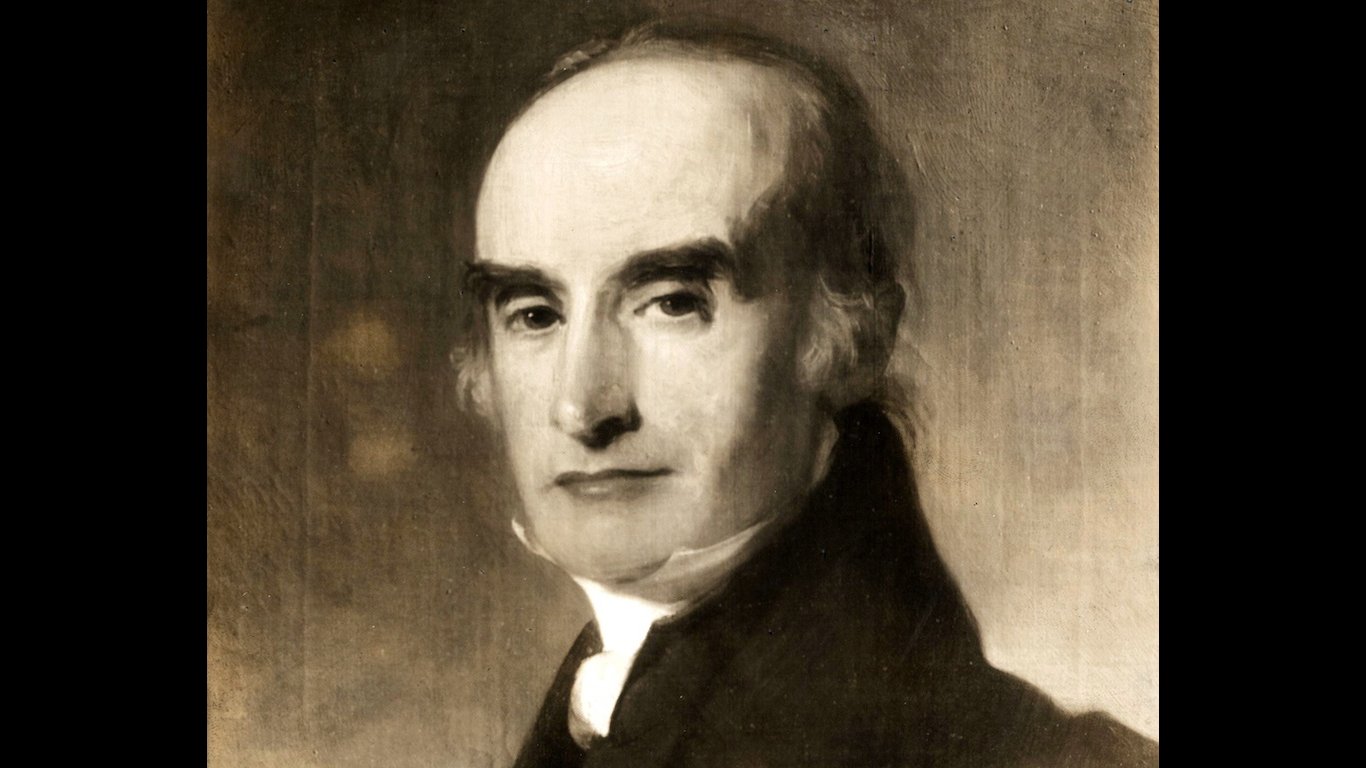
26. Hail Columbia
> Author: Joseph Hopkinson
> Year written: 1798
“Hail Columbia” was based on music composed by German immigrant Philip Phile, and the words were written in 1789 by Philadelphia judge Joseph Hopkinson. The song was titled “Washington’s March,” or “President’s March” to honor George Washington, who was traveling through New Jersey on his way to New York City for his presidential inauguration. Eventually, Hopkinson changed the song’s title to “Hail Columbia” at the request of singer-actor Gilbert Fox in 1798. Fox performed the song at a concert in Philadelphia, and it was a sensation. Among those who eventually heard the song was President John Adams. The song was considered the unofficial national anthem up until the 1890s.

25. Song of the Patriot
> Author: Johnny Cash and Marty Robbins
> Year written: 1981
No one does patriotic songs like country and western performers, and front and center was Johnny Cash. In “Song of the Patriot,” Cash left no doubt where he stood: “I’m a flag waving patriotic nephew of my Uncle Sam, a rough riding fighting Yankee man. I love mom and apple pie and the freedoms that we all enjoy, across this beautiful land.”
[in-text-ad]

24. Fanfare for the Common Man
> Author: Aaron Copland
> Year written: 1942
“Fanfare for the Common Man” is among the most widely known pieces of American classical music. Aaron Copland wrote the piece to rally Americans against fascism during World War II. The song has been used to open Bob Dylan and The Rolling Stones concerts and has been covered by rockers Emerson, Lake and Palmer. The song has also been played for presidents and at the opening of the National September 11 Memorial & Museum.

23. The Army Goes Rolling Along
> Author: Edmund Louis “Snitz” Gruber
> Year written: 1908
“The Army Goes Rolling Along” became the U.S. Army’s official anthem in 1956. The song’s origins go back to 1908, when Brigadier General Edmund Louis Gruber wrote “The Caissons Go Rolling Along.” Gruber, a descendent of Franz Gruber, who composed “Silent Night,” based the song on his experience while he was stationed in the Philippines.

22. The Marines’ Hymn
> Author: Unknown
> Year written: N/A
The origin of the music to the “Marines’ Hymn” is a march in a comic opera from composer Jacques Offenbach. There is nothing comical about the lyrics, which recount Marine victories during the Mexican-American War and the war against pirates of the Barbary States. It is not known for certain who wrote the lyrics, which were first printed in a Marine Corps magazine in 1919. Some verses have been credited to Colonel Henry C. Davis.
[in-text-ad-2]

21. Wild Blue Yonder (U.S. Air Force Song)
> Author: Robert Crawford
> Year written: 1947
Brigadier General H. “Hap” Arnold started a song-writing contest to create an anthem for the U.S. Army Air Corps to help establish an identity for the predecessor of the U.S. Air Force. Among those who submitted entries were composers Meredith Willson, whose credits would include the musical smash “The Music Man,” and the incomparable Irving Berlin. Neither composer would win. In the end, the winning entry was from Canadian-born amateur pilot Robert Crawford.

20. Anchors Aweigh (U.S. Navy Song)
> Author: Charles A. Zimmerman and Alfred Hart Miles
> Year written: 1906
“Anchors Aweigh,” the anthem of the U.S. Navy, originated in a request. In 1906, Navy midshipman Alfred Hart Miles approached Lieutenant Charles A. Zimmermann, the director of the Naval Academy Band, about composing a rousing football marching song for the class of 1907. Zimmerman composed the music and Miles wrote the words. Thus inspired, Navy went on to shut out Army in their annual game in December 1906.
[in-text-ad]

19. (They’re Coming To) America
> Author: Neil Diamond
> Year written: 1980
Singer-songwriter Neil Diamond’s “(They’re Coming To) America” is about the immigrant experience in the United States. It was a big hit when it was released as a single in 1981, and it was played at the Statue of Liberty’s centennial celebration in 1986. The song got newfound popularity after the 9/11 terrorist attacks.

18. Taps
> Author: Anonymous
> Year written: 1862
The familiar, mournful strains of the solitary bugler were first played during a burial ceremony for a slain Civil War soldier in 1862. Both the Union and Confederate armies performed the song at funerals, and it has become tradition to play it at military funerals. The song, whose composer is not known, is also used to indicate lights out for those serving in the military.

17. God Of Our Fathers, Whose Almighty Hand
> Author: George Warren
> Year written: 1876
“God Of Our Fathers, Whose Almighty Hand” is a Christian hymn composed to observe the centennial of the signing of the Declaration of Independence. The song has been sung by, among others, the Mormon Tabernacle Choir.
[in-text-ad-2]

16. Over There
> Author: George M. Cohan
> Year written: 1917
George M. Cohan wanted to write a song to rally the country as it entered World War I in 1917. He penned “Over There,” a flag-waving hit that would sell a mind-boggling 2 million copies, boosted by a robust campaign by publisher Leo Feist to promote the song to benefit the war effort. A portion of Feist’s proceeds, and all of Cohan’s, went to war charities and veterans groups.
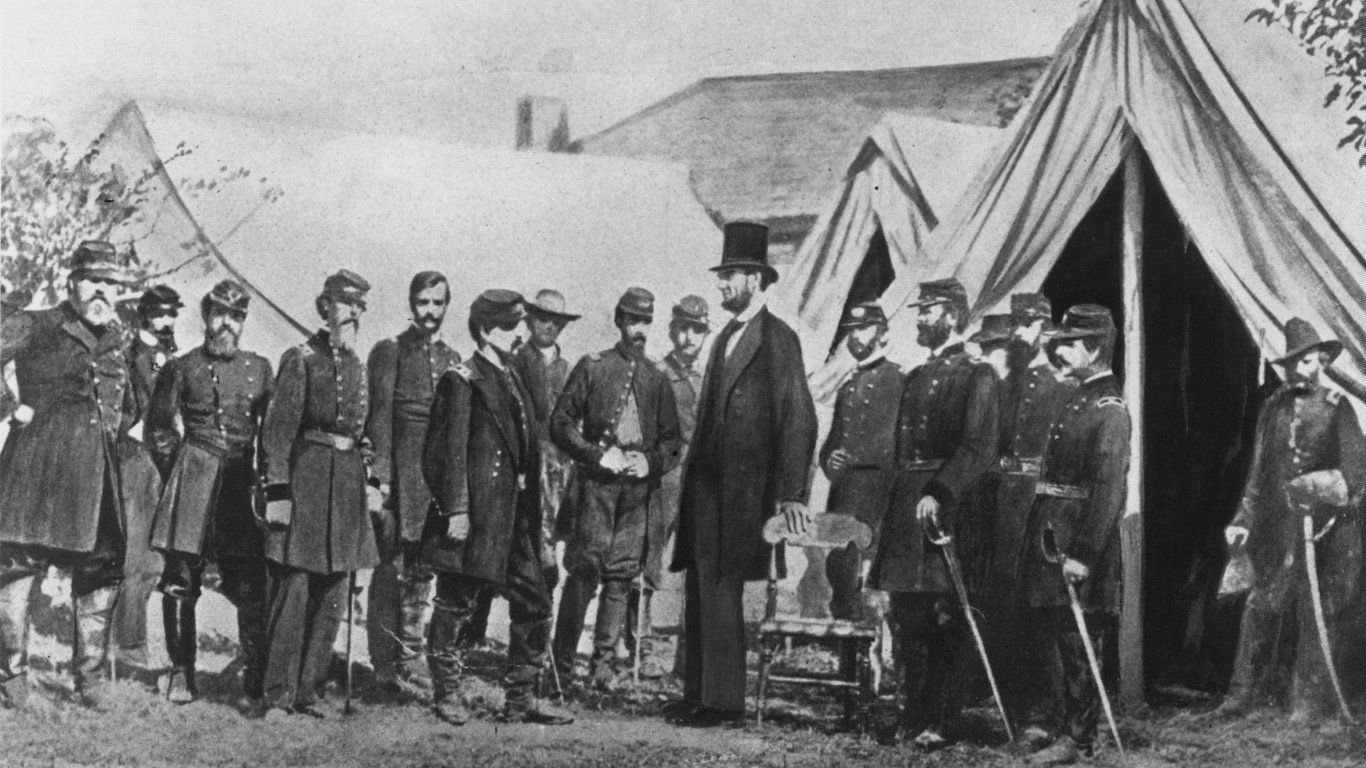
15. When Johnny Comes Marching Home
> Author: Patrick Gilmore
> Year written: 1863
The song was written by Irish immigrant Patrick Gilmore, a noted band leader in Boston. He and his band enlisted in the Union Army during the Civil War, where they served as musicians and stretcher bearers for the wounded.
Gilmore wrote “When Johnny Comes Marching Home” while he was posted in New Orleans. He said he adapted the tune from an African American spiritual song. Some listeners thought it was an anti-war song and it was picked up by northern Democrats who were opposed to the war. The song became popular among Union and Confederate soldiers alike. Eventually, the song came to be seen as a homecoming salute for servicemen and women returning from overseas.
[in-text-ad]

14. God Bless the U.S.A.
> Author: Lee Greenwood
> Year written: 1983
Country singer Lee Greenwood composed and performed the song. He said he wrote the song because he was inspired by servicemen and women attending his concerts.
The song was played at the 1984 Republican National Convention during a film about the life of President Ronald Reagan. “God Bless the U.S.A.” was popular during the Gulf War in 1991 and returned to popularity in 2001 after the terrorist acts on Sept. 11. “God Bless the U.S.A.” was nominated for a Grammy for best country song.
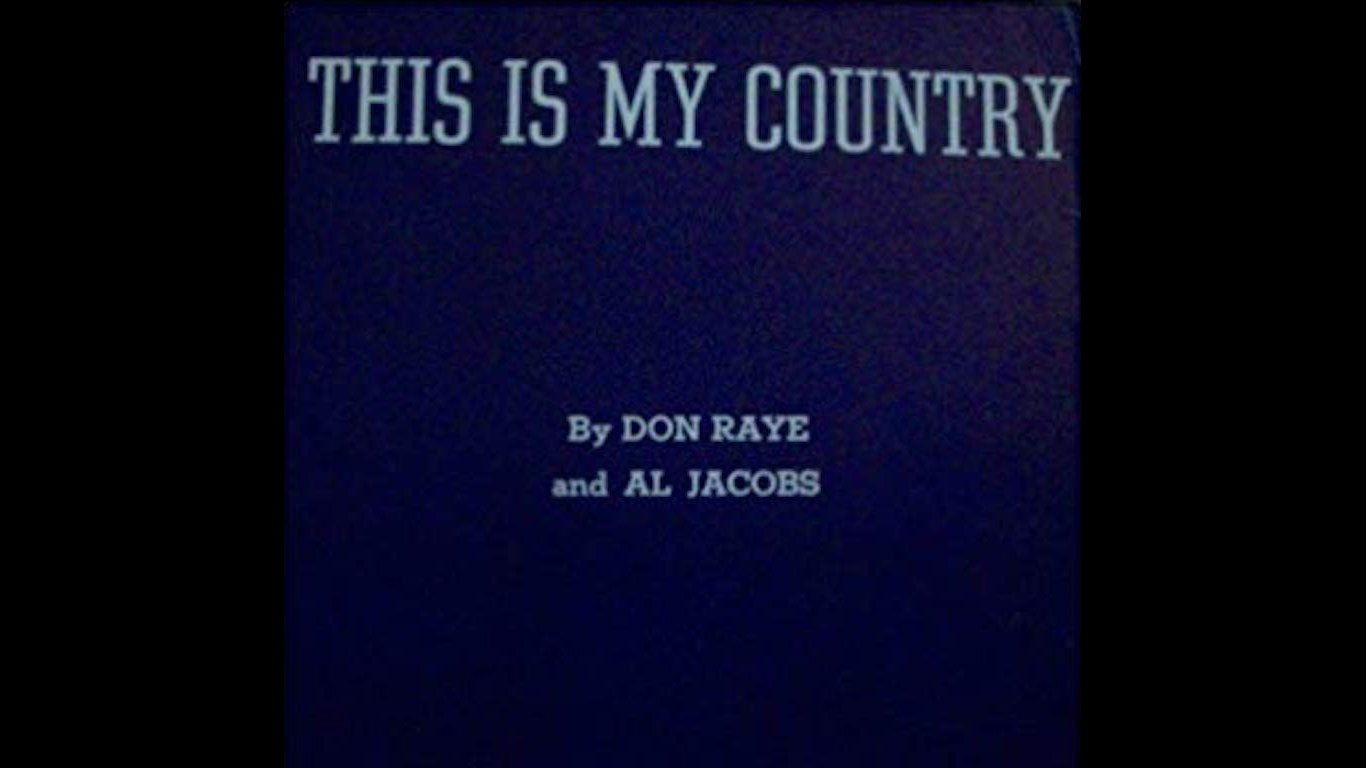
13. This is My Country
> Author: Al Jacobs and Don Raye
> Year written: 1940
“This is My Country” is a song written by Al Jacobs and Don Raye in 1940, at the end of the Great Depression and just before the United States entered World War II. Bandleader Fred Waring popularized the song in the 1940s, and among those who have performed it are the Mormon Tabernacle Choir and Tennessee Ernie Ford.

12. Columbia the Gem of the Ocean
> Author: Thomas a’ Becket
> Year written: circa 1843
The origins of “Columbia the Gem of the Ocean” are controversial. A musician named Thomas a’ Becket rewrote the words to a patriotic song originally penned by singer David T. Shaw. A’ Becket was accused of plagiarizing the words of a British song, “Britannia, The Pride of the Ocean,” that were written by British journalist Stephen Joseph Meany, originally as poem by the same name. A’ Becket claimed that “Britannia” was plagiarized from his song. The lyrics of both songs are somewhat similar.
“Columbia” is a derivative from Columbus and was used to mean the United States of America. “Columbia the Gem of the Ocean” was popular during the Civil War, and it became part of the U.S. Marine Corps Band’s repertoire.
[in-text-ad-2]

11. You’re a Grand Old Flag
> Author: George M. Cohan
> Year written: 1906
“You’re a Grand Old Flag” was the first song from a stage musical to sell over a million copies of sheet music. George M. Cohan wrote for the song originally for his 1906 musical “George Washington, Jr.”
The title comes from an encounter Cohan had with a Civil War veteran who had fought at the Battle of Gettysburg. Cohan noticed the former soldier held a folded, worn-out American flag. The veteran said to Cohan, “She’s a grand old rag.” Cohan liked the line so much that he titled the song “You’re a Grand Old Rag.” But some people objected to using the word rag for the flag, so Cohan changed the title to the one we know today. The song was popular during both world wars and has appeared in many movies, most famously in the 1942 film “Yankee Doodle Dandy,” a biopic about Cohan starring James Cagney.
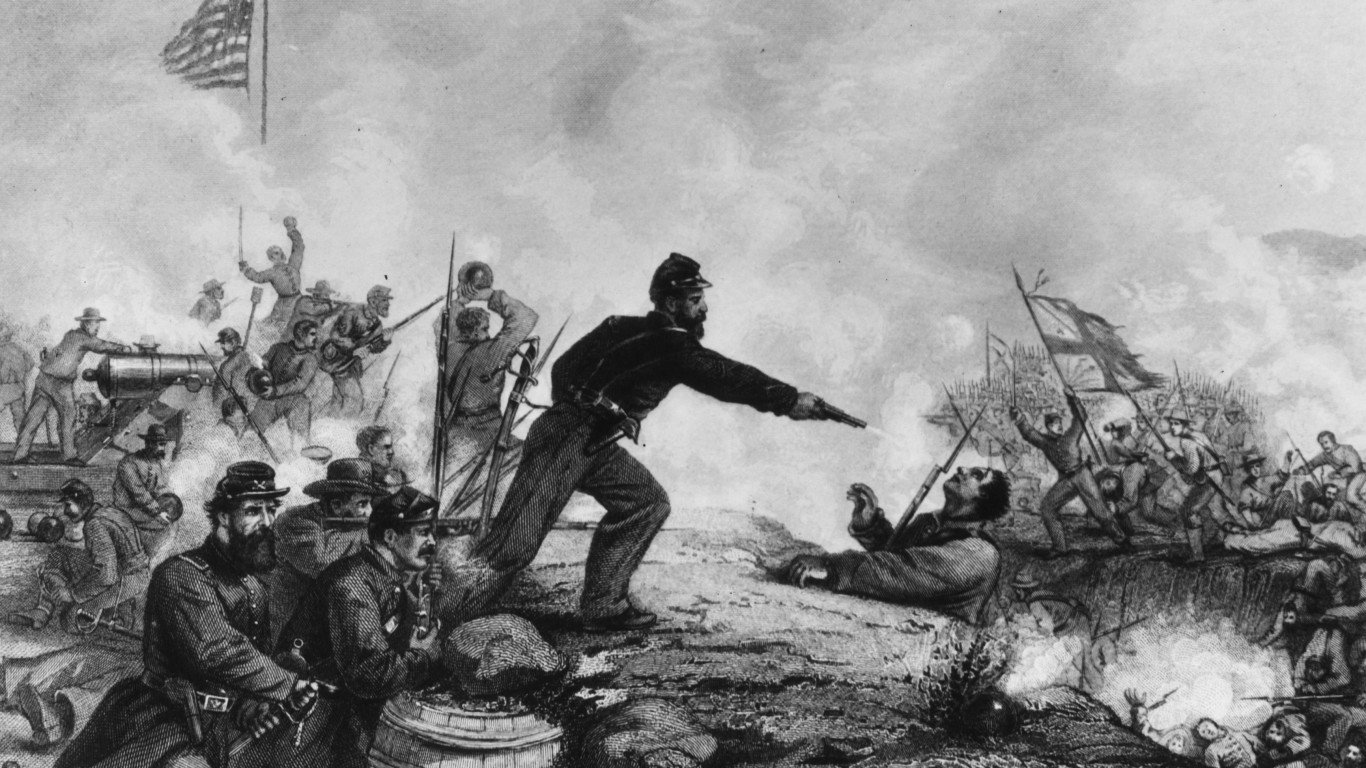
10. Battle Cry of Freedom
> Author: George Frederick Root
> Year written: 1862
“Battle Cry of Freedom” was composed by George Frederick Root, one of the prominent songwriters of his day. He composed the song in 1862 to rally Union troops and boost enlistment during the Civil War. The song was also used in 1864 to help the re-election campaign of President Abraham Lincoln. There are Union and Confederate versions of the song. Root’s song can be heard on segments of Ken Burns’ “Civil War” television series.
[in-text-ad]
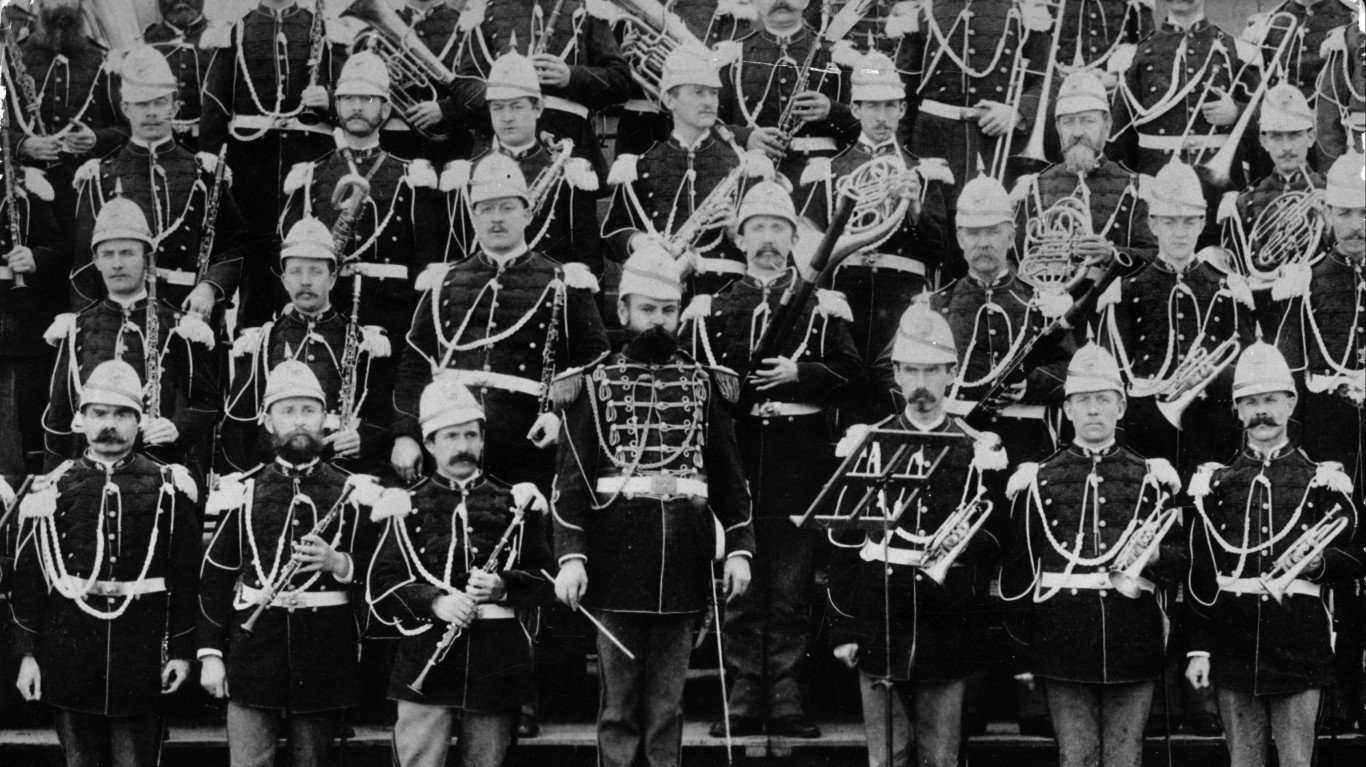
9. The Stars and Stripes Forever
> Author: John Philip Sousa
> Year written: 1896
“The Stars and Stripes Forever” is one of the most rousing songs in the American music canon. John Philip Sousa, who grew up in Washington, D.C. during the Civil War, was returning to the United States from a European vacation with his wife in 1896. Onboard the ship, he said he heard a band playing the same rhythmic beat in his head. When he got home, he penned the music for what became “The Stars and Stripes Forever.” It was an immediate hit and became the unofficial anthem of the Spanish-American War. Whenever the song was played, sometimes two or three times at the same concert, the audience would stand. For many people, it was like a national anthem. Sousa believed the song was the greatest march ever written.

8. This Land is Your Land
> Author: Woody Guthrie
> Year written: 1940
“This Land is Your Land” is one of the best known folk songs in America. It was written by Woody Guthrie as a retort to Irving Berlin’s “God Bless America” after the Great Depression. Guthrie originally titled the song “God Blessed America for Me” because he believed Berlin’s song did not reflect the true America, where he believed land and wealth were not distributed equally. Guthrie’s song is more than a travelogue of America’s beauty; it tells the listener that the nation’s physical attributes belong to all of us. The song has been covered by many artists, including Bing Crosby, Judy Collins, Harry Belafonte, and most famously Pete Seeger.
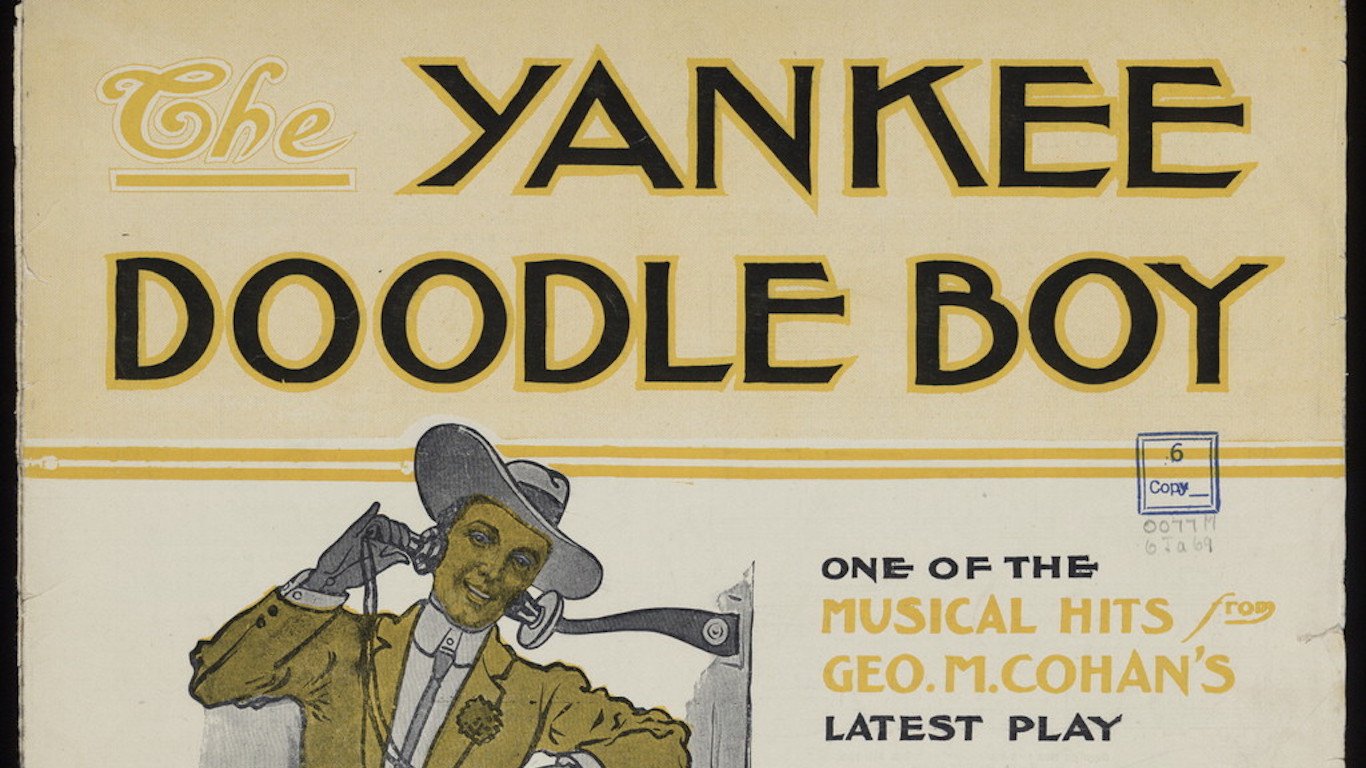
7. Yankee Doodle Boy
> Author: George M. Cohan
> Year written: 1904
The words and music to “Yankee Doodle Boy” (also known as “I’m A Yankee Doodle Dandy”) were written by song and dance vaudevillian George M. Cohan and were heard during the first act of Cohan’s first full-length musical “Little Johnny Jones” in 1904. Many shows and movies have included “Yankee Doodle Boy,” among them the Academy Award-winning 1942 film “Yankee Doodle Dandy” and the 1969 Broadway show “George M!” that starred Joel Grey in the title role.
[in-text-ad-2]
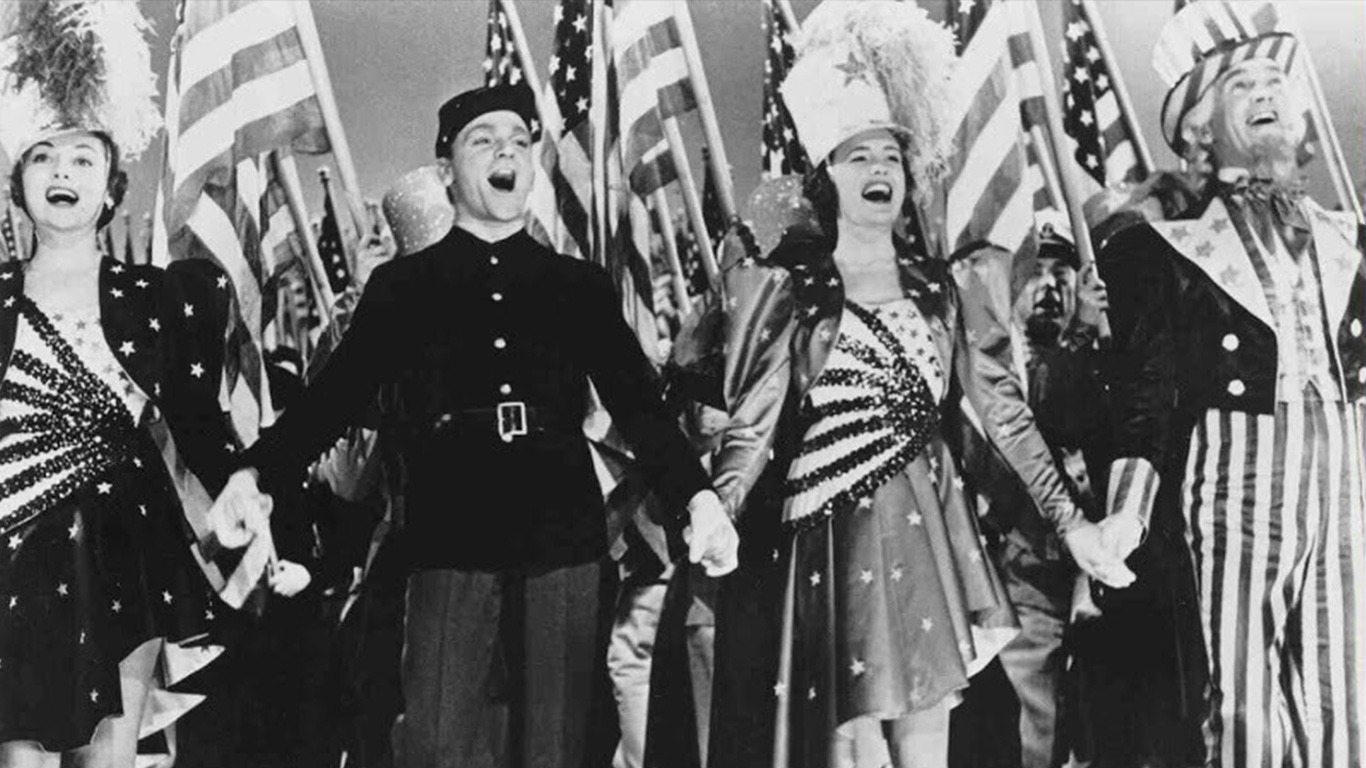
6. Yankee Doodle
> Author: Anonymous
> Year written: 1755
“Yankee Doodle” remains one of America’s most enduring marching tunes, though its origins are obscure. We do know that it was written before the American Revolution and that the phrase “Yankee Doodle” was a derisive British term for colonial soldiers. One story about the song’s origins says that British army surgeon Dr. Richard Schackburg wrote the song during the French and Indian Wars, and that the lyrics poked fun at the colonials who fought with the British troops.

5. My Country ‘Tis of Thee
> Author: Samuel Francis Smith
> Year written: 1831
Samuel Francis Smith wrote the words for “My Country ‘Tis of Thee” in 1831 as a peaceful ode to America. It was considered as a possible national anthem. Smith wrote the song’s lyrics after noted organist and composer Lowell Mason asked him to translate music that was in German. One melody in particular — the same melody in the British song “God Save the King” — impressed him, and he wrote lyrics to it.
The song’s melody served as the national anthem in countries such as Denmark and Prussia. Following the American Revolution, the song was adapted for use during the inauguration of President George Washington in 1789.
[in-text-ad]

4. Battle Hymn of the Republic
> Author: Julia Ward Howe
> Year written: 1861
There are few more stirring songs than Julia Ward Howe’s march written during the Civil War. The song, originally called “John Brown’s Body” in 1859, was about the abolitionist, and Union soldiers sang it early in the Civil War. Howe, also an abolitionist, heard the song sung by Union troops and was inspired to write words that she thought were appropriate to the music as a poem. It was published in the “Atlantic Monthly” magazine in February 1862. “Battle Hymn of the Republic” was one of Winston Churchill’s favorite songs. It was sung by Andy Williams at the funeral of Robert Kennedy and was performed at the National Cathedral in Washington, D.C. and at St Paul’s Cathedral in London to honor those killed during the 9/11 terrorist attacks. It has become one of the nation’s patriotic song standards, sung by performers such as Judy Garland and Whitney Houston.

3. America the Beautiful
> Author: Katharine Lee Bates
> Year written: 1893
Katharine Lee Bates, an English literature professor at Wellesley College, was on a lecture trip to Colorado in 1893. During a hike up Pikes Peak, when she got to the summit, she was so taken by the vast expanse before her that she wrote “America the Beautiful.” The song is beloved for its unabashed love the American landscape and was considered by Congress as the national anthem.
Bates’ poem first appeared in the weekly newspaper “The Congregationalist” in 1895. At first, the words were sung to any song the lyrics would fit. Eventually, the melody with which it was paired was written in 1882 by church organist Samuel Augustus Ward from Newark, New Jersey. Among the most famous versions of the song is the one performed by Ray Charles.

2. God Bless America
> Author: Irving Berlin
> Year written: 1938
The stars were aligned when singer Kate Smith asked Irving Berlin to write her a patriotic song she could sing on her radio show to be broadcast from the World’s Fair in New York on Nov. 10, 1938, to honor America’s war veterans. Berlin remembered he had written a song 20 years earlier for a comedy and reworked the lyrics and fashioned the song we know today. Smith’s booming voice did justice to the soaring music and lyrics.
The song, which some have called our second national anthem, was played frequently after the 9/11 terrorist attacks, and Smith’s version is still played during every New York Yankees home game, with the lyrics posted on the scoreboard.
[in-text-ad-2]

1. The Star-Spangled Banner
> Author: Francis Scott Key
> Year written: 1814
“The Star-Spangled Banner” became our national anthem in 1931. Since that time, the song has been exalted by the voice of Whitney Houston; mangled by the cringeworthy strains of Roseanne Barr; electrified by Jimi Hendrix’s famous guitar solo; and soulfully interpreted by José Feliciano.
We know the circumstances of how the song’s words were written. Francis Scott Key, a lawyer, had been trying to negotiate the release of a friend from British troops during the War of 1812. He was detained aboard a boat in Baltimore’s harbor by the British Navy, which was shelling Fort McHenry the night of Sept. 13, 1814. Key watched the bombardment from the boat and at dawn was amazed to find the American flag still flying above the fort. Inspired by what he saw, he penned the words to what would become our national anthem. He reworked the lyrics to the tune of “Anacreon in Heaven,” a song associated with a gentlemen’s club of amateur musicians in London. For the next century, “The Star-Spangled Banner” was considered as the country’s unofficial national anthem. It gained additional impetus in 1917, when it was played during the World Series that year to honor soldiers fighting in World War I. The song touched a chord, and by the following season, it was being played at every game.
Essential Tips for Investing: Sponsored
A financial advisor can help you understand the advantages and disadvantages of investment properties. Finding a qualified financial advisor doesn’t have to be hard. SmartAsset’s free tool matches you with up to three financial advisors who serve your area, and you can interview your advisor matches at no cost to decide which one is right for you. If you’re ready to find an advisor who can help you achieve your financial goals, get started now.
Investing in real estate can diversify your portfolio. But expanding your horizons may add additional costs. If you’re an investor looking to minimize expenses, consider checking out online brokerages. They often offer low investment fees, helping you maximize your profit.
Thank you for reading! Have some feedback for us?
Contact the 24/7 Wall St. editorial team.


